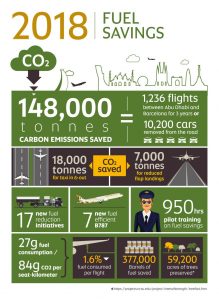Carrier reduced 148,000 tonnes of carbon emissions in 2018
Etihad Airways continues to reduce carbon dioxide emissions by implementing fuel saving initiatives, reinforcing its commitment to sustainability.
Following a number of improvements aimed at enhancing operational fleet efficiencies, Etihad Airways reduced 148,000 tonnes of carbon emissions in 2018. The savings are equivalent to approximately 1,236 flights between Abu Dhabi and Barcelona or the removal of over 10,200 cars from the road.

Fuel consumption is influenced by several factors such as air traffic management, weight carried and how the aircraft is flown. Last year, the airlines B777-200s were retired in favour of the most fuel efficient commercial aircraft in operation, the Boeing 787 Dreamliner, due to its lightweight composite structure.
“By increasing collaboration on a monthly basis within the airline’s flight operations, network operations, ground operations areas and fleet engineering, Etihad saw noticeable improvements to its fuel savings and emissions profile, a top agenda for a sustainable airline,” remarked Captain Sulaiman Yaqoobi , VP Flight Operations, Etihad Airways.
Etihad pilots play a critical role in the airline’s environmental initiatives, significantly increasing savings by analysing insights and flight data to effectively apply key fuel efficiency procedures. Utilising a single engine to taxi the aircraft in and out on the tarmac reduces fuel burn. To reduce drag and conserve fuel, pilots select lower flap settings.
Statistics on reduced engine taxiing as well as reduced flap landings have demonstrated record-breaking results. The achieved savings equated to saving fuel for approximately 1,440 hours of flying time, saving 7,900 tonnes of fuel and eliminating 24,900 tonnes of carbon dioxide.
A new app has been introduced to all pilots which provides up-to-date information on current fuel-saving achievements as well as saving opportunities for every flight they are performing.

